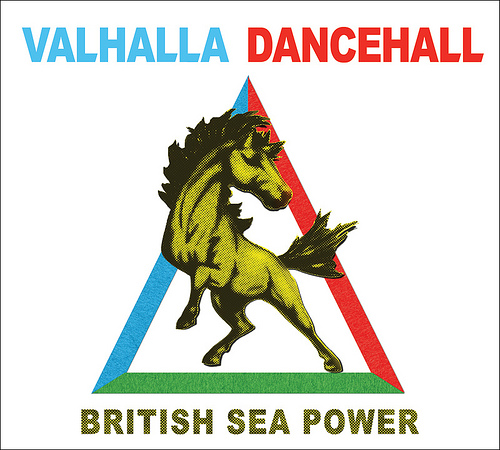At first blush, it seems as though British Sea Power’s fourth studio album, Valhalla Dancehall, is going for the jugular. The group’s last album, 2008’s Do You Like Rock Music?, was (unfairly) maligned because it dared to aim for U2-level grandiosity, but most of that backlash came from a perceived disconnect between BSP’s huge sound and more modest level of hype. It certainly wasn’t based on any musical shortcomings on their part, because Rock Music was, and still is, a thoroughly enjoyable record.
Valhalla Dancehall’s opening track, “Who’s in Control,” retains most of the previous record’s intensity and lands somewhere between the Clash and Arcade Fire. But the song, as it turns out, is something of a red herring: it’s not so much that this record is a radical change in sound from the last one, more that it’s kind of stylistically all over the place. There are some tracks that wouldn’t have sounded at all out of place on Rock Music, but there are also nods to the revved-up punk of their 2003 debut and more hushed balladeering than any of their previous work. None of this is out of their wheelhouse, which is both a good and a bad thing.
Even when British Sea Power blow their sound up to stadium proportions, it doesn’t feel forced. The way the hazy production blends softens the overdriven guitars on some of the louder tracks on Valhalla can make a lot of these songs run together, but there’s no denying that “Georgie Bay” and “Observe the Skies” are fine pieces of songwriting. It’s the ballads, however, that truly shine here. The gorgeous “Luna” showcases Yan’s airy, breathy voice, which, as it turns out, is more well-suited to the ballads than the rockers. The standout track is “Living is So Easy,” a likeable pastiche of mid-‘80s Cure and mid-‘90s U2.
It’s only towards the back of Valhalla Dancehall that British Sea Power begin to wear themselves thin. The early part of the record succeeds largely because it doesn’t stick with one sound for too long, but too many mid-tempo tracks towards the end—including the unnecessarily 11-minutes-long “Once More Now”—make the record feel longer than it is, which is a shame, because an album with this many winners shouldn’t feel like a chore to listen to.
For most of Valhalla Dancehall, the diversity in sound works to British Sea Power’s advantage, but it also leaves the album feeling weirdly unsatisfying. It’s not that any of this is bad—quite the opposite, actually—but this record doesn’t feel as complete as their others. This is a band with big ambitions but not too much hype, which often makes them come across as unpretentious and unassuming, but what’s missing here that made their last few records great is a sense of purpose. Valhalla Dancehall is a solid album, but it begs the question: so what?

